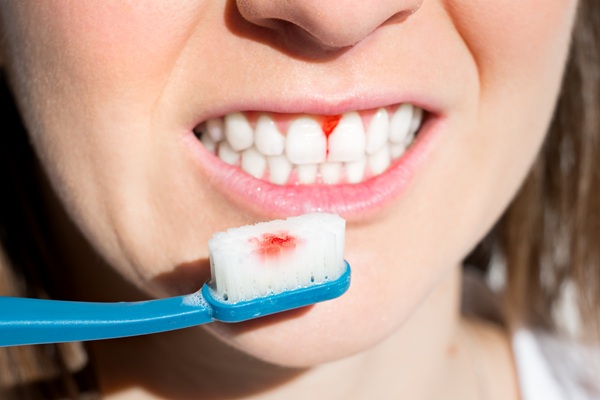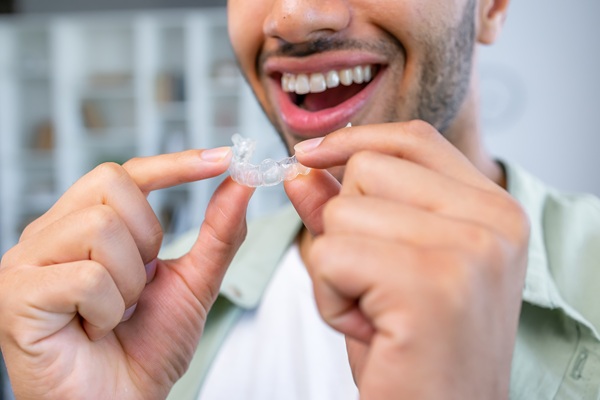Routine Dental Care When You Have Braces

Patients who have received braces for the first time may wonder how to implement routine dental care for teeth that are now covered by metal or ceramic brackets. Wires can get in the way of daily flossing, and it can be difficult to brush around the components of new braces. Use the following tips to create a new dental routine as well as to banish uncertainty when it comes to caring for your new braces.
3 steps to follow when caring for teeth with braces
A braces patient’s new routine dental care may look slightly different, but the basic principles of caring for teeth should remain the same. Brushing and flossing are a little more complicated, but most patients quickly adapt.
1. Follow a thorough brushing routine
Patients should brush twice a day: This part of the routine should not change upon receiving braces, either metal or ceramic. Even clear aligners can be removed for regular brushing, and this type of braces may make routine dental care easier on patients who do not want to deal with brackets and wires that can get in the way.
Though the routine can stay the same, the type of brush may need to change. Using an electric toothbrush can be a quicker and easier way to brush around braces, and the smaller heads of these toothbrushes can more easily reach the molars as well.
2. Invest in a water flosser
Many patients swear by various types of water flossers that work by using a sharp burst of water to clean all the nooks and crannies of the mouth. Thanks to the concentrated pressure of the water, this type of instrument can effectively clean in between wires and other types of dental appliances that are attached to braces.
Regular flossing can be performed with the same type of floss the patient previously used, but a special instrument may need to be used to “thread” the floss between the wires. This practice can be cumbersome to complete every day, which is why a water flosser can save time and potentially help the patient floss more thoroughly.
3. Visit the dentist regularly for cleanings
Routine dental care, including cleanings, can be managed with braces. Depending on the dentist’s preference as well as the patient’s, patients may be able to have the wires removed for a thorough cleaning. If a dentist suspects a cavity, braces do not necessarily prevent a dentist from filling it. Treatment of minor cavities a week before the patients get braces removed can likely be delayed until the removal, but a more serious cavity should be filled immediately.
Conclusion
While routine dental care for patients with braces may be a bit more complicated than before, it is important to keep teeth healthy as they undergo the straightening process. Caring for teeth with braces is not too different from brushing and flossing without braces. Patients should ensure that good dental health is maintained throughout the months or years in which orthodontics are worn to prevent future dental problems.
Request an appointment here: https://www.yourlosangelesdentist.com or call Lida Davani, DDS at (310) 402-2149 for an appointment in our Los Angeles office.
Check out what others are saying about our dental services on Yelp: Routine Dental Care in Los Angeles, CA.
Related Posts
In recent years, more patients have been asking general dentist professionals about straighter teeth. Orthodontic treatment has come a long way in the last decades. Patients may think that traditional braces are the only option, but clear aligners and appliance therapy are also available now. When having this conversation, it is important that patients discuss…
Good oral care is critical for overall well-being, and adults who routinely visit a general dentist are less likely to have problems with their teeth and health. Visiting a dentist twice per year can help detect and remediate the following conditions: CavitiesGum diseaseOral cancerTooth misalignmentSystemic diseaseMany people put off visiting a dentist due to fear…
When a patient has a cavity, a general dentist thoroughly takes out all the decayed area of the tooth and replaces it with a filling in the empty space to prevent future decay. When it comes to the type of filling, there are various options from which the patient may choose. They each have advantages…
Despite what many people think, a general dentist wants to see strong, healthy teeth when patients come into the office. Dentists are, in fact, the most prominent champions of clean and cavity-free teeth; they work to educate patients and community members about proper oral care techniques and cleaning practices. With the right level of care,…


